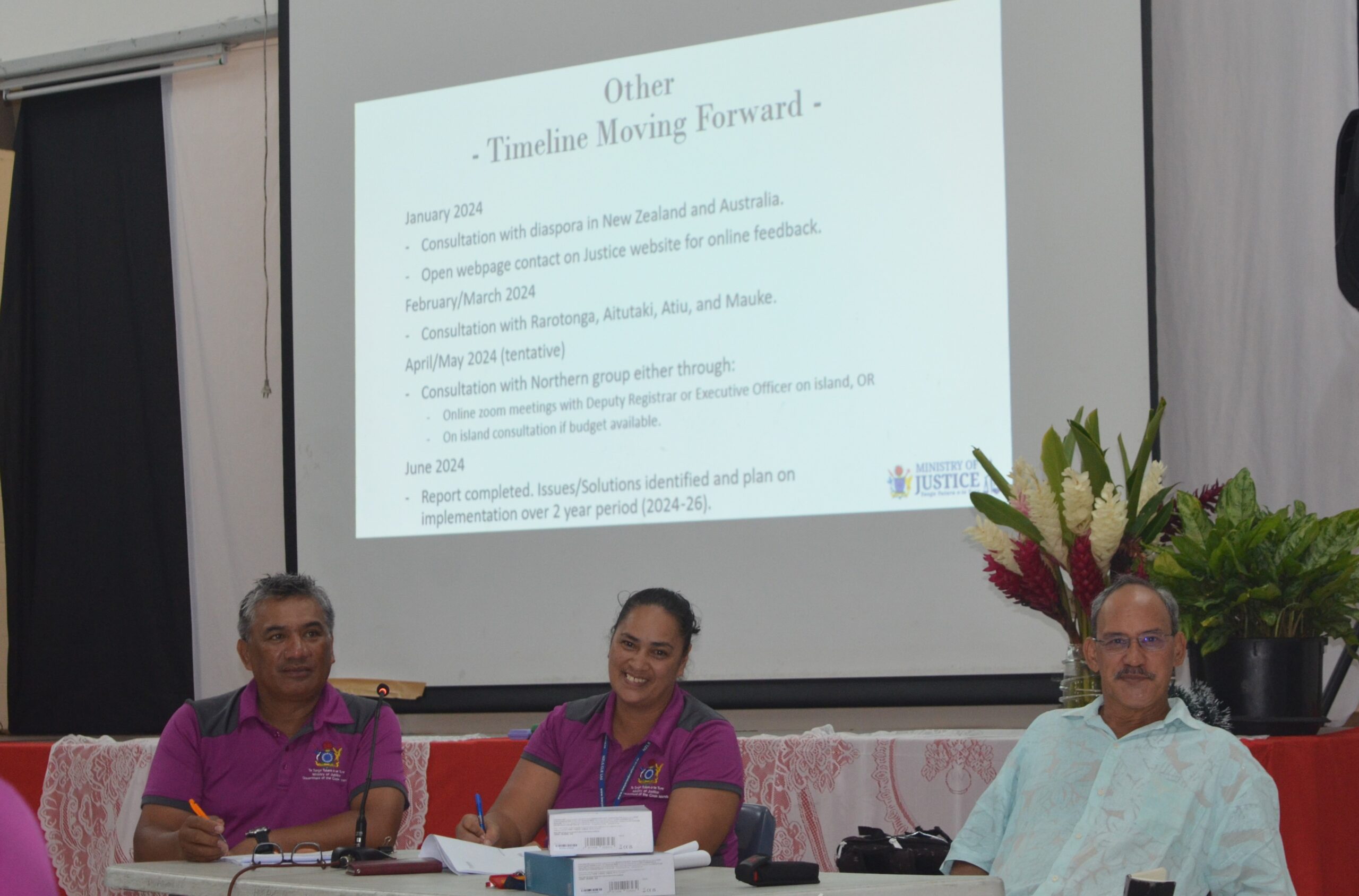Absentee landowners major issue
Wednesday 28 February 2024 | Written by Melina Etches | Published in Economy, Environment, Local, National

Ministry of Justice staff and Minister for Justice, Vaine “Mac” Mokoroa (left), at the Vaka Te-Au-O-Tonga public meeting to receive input into reforming Cook Islands Land Law. MELINA ETCHES/24022706
Cook Islands is reforming its land laws and have started public meetings on Rarotonga to gather suggestions and feedback from Cook Islanders.
A good 100 calm, collected, and concerned visiting and resident landowners attended the island’s first Te Tango Tutara O Te Ture Ministry of Justice public meeting on Monday night for Vaka Te Au O Tonga at the Sinai Hall.
Over 100,000 Cook Islanders live in Aotearoa New Zealand and Australia, which means that about 90 per cent of Cook Islanders do not live in the country.
Many of these Cook Islanders retain rights over land, even though some of these absentee landowners were born overseas and have never stepped on Cook Islands soil.
The responsibilities and obligations of absentee landowners (off-island landowners), Occupation Rights to be passed to direct descendants, early succession to land, and Power of Attorney’s (POA), doing away with the Privy Council (London), are just some of the persisting land law matters that were raised on the night.
Minister for Justice Vaine “Mac” Mokoroa expressed that most Cook Islanders overseas have no idea about the pressing land law issues Cook Islanders are facing at home.
Bruce Manuela from Justice presented the ministry’s “focused discussion points: in the meeting, some of these include:
- Occupation Right to Land: Limited to 60 years (considered an Alienation); Conditions to building (5-7 years to build/complete); Buildings are affixed to land; New Practice Note – Declare existing Occupation Rights; Decisions made by 50% + one landowners; Landowners off-island.
- Off-Island Landowner: “Land banking” – acquiring interest in land and not developing it; Sale of Land – acquiring interest in land only to sell it (proceeds go to individual and not to family); Dormant Land – interest in land cannot be acquired/developed because not able to make a decision.
- Inheritance: Land is generally not fee simple; Occupation Right does not pass to descendants, unless the Occupation Right Order is granted to you and descendants (still expires after 60 years); Cannot be given by “Will”.
Absentee landowners are one of the main issues Cook Islanders at home are faced with in trying to secure an Occupation Right, lease, develop their land, or host a land meeting.
A participant suggested that maybe Cook Islanders should be required to return home for three months (similar to the electoral roll) before they can participate in land matters.
One of the responses from the audience in regards to absentee landowners was that it is well known that the Cook Islands population (around 11,000) is drastically depleting, and the nation cannot offer or compete with outside-of-the-island wages, opportunities, and education.
“But we can offer a pathway of hope to whakapapa (Māori genealogy), to your tupuna, to your lands, so succession must continue for those people,” the participant said.
“I can see the value of perhaps a way that people are not aware that they must participate in decisions on their land, that their presence in Rarotonga is a way to do that.
“If you’re wanting our absentee landowners to participate in decisions by coming home to do that then access to participate in decisions can’t be three months – it would have to be a shorter period of time.
“But I do agree with being home and participating in the decision and taking up your responsibilities, because being a landowner is a responsibility and you just can’t let it lie dormant.”
Last night, the Land Law meeting was held in Vaka Puaikura.
Tonight, the Vaka Takitumu meeting will be held at the Titikaveka CICC Hall from 6pm to 8pm.
Te Tango Tutara O Te Ture conducted these meetings with Cook Islands communities in both Aotearoa New Zealand and Australia last month.














































